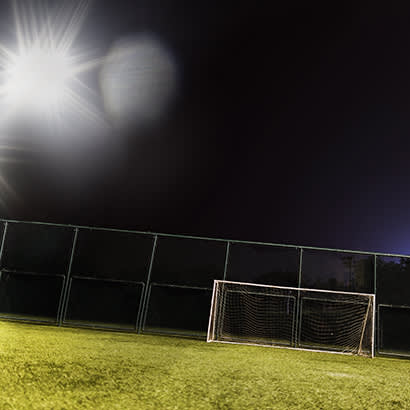
For an enhanced digital experience, read this story in the ezine.
Lighting of park and recreation areas is a multi-dimensional challenge, from patron safety to adjacent property lawsuits. Sustainability is one of the many considerations.
The following is a snapshot of a process City of Lee’s Summit (Missouri) went through when developing lighting strategies for our outdoor park areas. (A similar process was used for indoor lighting needs.)
1. What specific uses are being addressed by using lighting? Keeping sports venues open, walking or running, cycling, parking, camping, navigating restrooms, lighting playgrounds and shelters, and crime prevention are examples of different uses with varying needs.
2. What footcandles and light quality are needed to address users’ needs?
3. Will there be an impact or problems with spillage of the footcandles and/or glare on adjacent properties or other park-usage areas?
4. What is the cost of installation, maintenance and utility consumption?
5. How many users and user hours will be generated from this addition? Will any revenues be generated to offset the costs of installation, maintenance, supervision and utility consumption?
6. Is it environmentally insensitive to native habitat needs? Does it create light pollution and add to energy depletion issues in your area?
7. Due to the lighting and corresponding increased use, will there be a need for supervisory/security staff and/or surveillance equipment? If so, what will that initial and ongoing cost be?
8. What is your liability assessment?
As you consider these decisions, you need to add one more option: Don’t light it!
While many of our areas get lighting, not all areas need to be lighted. For instance, in the case of walking trails, lighting will make areas more inviting, but it also can cause trails to become more dangerous by giving users a false sense of security. Lighting can create shadows for people with bad intentions to be invisible to trail or other park users.
Most park and recreation professionals, park users and even the police often assume that lighting always will make areas safer. Police usually will tell you lighting is beneficial. For them and the user, it can be, but only when it is designed carefully and coupled with a police or other security presence to provide protection. Low-level lighting, like “security lighting,” can be an attractor for groups wanting to congregate and engage in illegal behaviors, like drugs, illegal alcohol use or worse, without fear of personal recognition.
As you conduct your analysis, at least consider the no-lighting option. Foregoing lighting means no installation, no extra maintenance requirements or utility costs due to additional use; no light pollution or spillage into other areas; no energy consumption; and potentially no surveillance needs for protecting patrons. A good curfew and personal protection signage that includes safe places for the desired activity could save lives and tax dollars. Lastly, the savings from avoiding unnecessary lighting costs could provide the resources to develop and maintain additional unlighted parks.
This article is a response to the article, “Portland Parks & Recreation’s Sustainable Park Pathway Lighting Efforts,” from the April 2021 issue of Parks & Recreation magazine.
Thomas Lovell Jr., MPA, CPRA, is Administrator Emeritus at Lee’s Summit Missouri Parks and Recreation.

